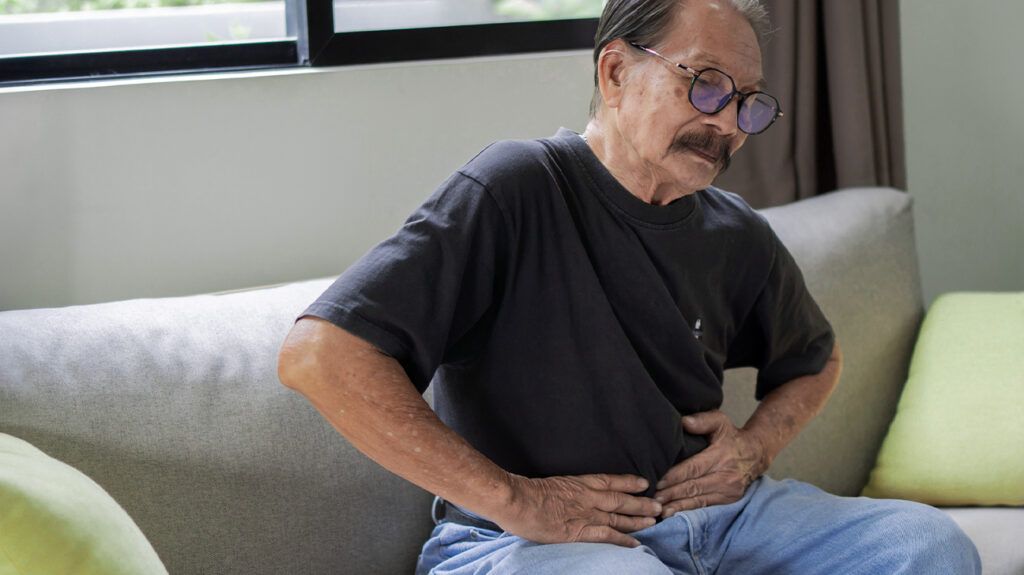Diverticulitis occurs when pouches that extend outward from the colon wall become inflamed. Symptoms of diverticulitis can include abdominal pain, constipation, and diarrhea.
These pouches, or diverticula, can extend or protrude without becoming inflamed. Doctors refer to this as “diverticulosis.”
This article explores diverticulitis in more detail, including its causes, symptoms, and treatments.

As people age, they are
However, in some people, the diverticula may become inflamed. Doctors refer to this inflammation of the diverticula as “diverticulitis.”
Symptoms of diverticulitis
- pain, usually on the lower left side of the abdomen
- diarrhea or constipation
- fever
- chills
- nausea or vomiting
People with diverticulitis often experience severe and sudden abdominal pain. However, the condition may also cause mild pain that worsens over a few days. Additionally, the intensity of the pain may vary over time.
According to the National Health Service (NHS), diverticulitis may also cause rectal bleeding or mucus. If a person passes blood or mucus in their stool, it is best to contact a healthcare professional.
Healthcare professionals
However, research from 2017 shows that a person’s genetics may play a role in diverticulosis and diverticulitis.
Other factors that may increase a person’s likelihood of developing diverticulitis include:
- eating a diet that is high in red meat and low in fiber
- living with obesity
- smoking (if applicable)
- not exercising regularly
- taking certain medications, such as steroids and nonsteroidal anti-inflammatory drugs (NSAIDs)
According to the NHS, there is not enough evidence to fully support the link between lack of dietary fiber and the formation of diverticula.
However, fiber usually helps soften stools, and not consuming enough dietary fiber may lead to hard stools. This may cause more pressure or strain on the colon as muscles push the stool down.
As a result, this pressure may create weak spots in the outside layer of the colon muscle, allowing the inner layer to squeeze through and form diverticula.
The NHS highlights that diverticulitis is more common in Western countries, where dietary fiber intake is much lower.
An infection can cause the diverticula to become inflamed. According to the NHS, a diverticulum might get blocked, possibly by a piece of stool. Bacteria in the stool may rapidly multiply and spread, causing an infection.
Some possible complications of diverticulitis include:
A healthcare professional may start the diagnostic process for diverticulitis by looking at a person’s medical history and conducting a physical examination.
They may also order diagnostic tests,
- blood tests
- stool tests; a doctor will provide a person with a container for catching a stool sample, which they will then send or take to a laboratory for testing
- imaging scans, which may include MRI, CT, and ultrasound scans
- colonoscopy
According to the American Gastroenterological Association (AGA), doctors may misdiagnose colon cancer as diverticulitis, in rare cases.
Therefore, the AGA recommends that if a person with diverticulitis has not recently had a colonoscopy, they need to undergo a colonoscopy about 6–8 weeks after their diverticulitis episode clears up. This is to check for any signs of colon cancer.
Treatments for diverticulitis
- antibiotics, although these medications may not always be necessary
- a clear liquid diet, which a doctor may recommend a person tries for a short amount of time to allow their colon to rest
- pain medications, such as acetaminophen
- antispasmodic medications, to help relieve muscle spasms
If a person’s symptoms do not ease with treatment, a doctor may recommend colon resection surgery. During a colon resection procedure, a surgeon removes a damaged part of the colon and joins the remaining healthy parts together.
Treatment for diverticulitis complications
It is best to contact a healthcare professional immediately if a person experiences rectal bleeding, which may result from diverticular bleeding.
Treatment for diverticular bleeding may involve:
- blood transfusions
- colonoscopy, during which a doctor may use tools to stop the bleeding
- angiogram, during which a radiologist may administer medications to stop the bleeding
- surgery
If a person has an abscess, a healthcare professional may:
- prescribe antibiotics
- drain the abscess, if it is large or does not respond to antibiotics
- recommend surgery after the abscess heals, if it is large to prevent it from coming back
Doctors may also recommend surgery to treat:
- peritonitis
- fistulas
- intestinal obstruction
- intestinal perforation
In the past, healthcare professionals used to recommend that people with diverticulitis avoid eating nuts, seeds, and popcorn.
However, the National Institute of Diabetes and Digestive and Kidney Diseases advises that the
Instead, a person can speak with their doctor about whether they may benefit from making any changes to their diet. In some cases, a healthcare professional may recommend consuming more fiber. Sources of fiber include fruit, vegetables, and whole grains.
People may find it useful to keep a food journal to work out whether a certain type of food triggers diverticulitis symptoms. They can discuss their food journal with a doctor who can recommend dietary changes if necessary.
It is advisable for a person to speak with a doctor about whether they should make lifestyle modifications to help prevent diverticulitis.
A doctor may recommend:
- eating a diet that is low in red meat and high in fiber
- exercising regularly
- maintaining a moderate weight
- quitting smoking (if applicable)
Healthcare professionals may also recommend surgery for certain individuals after they experience diverticulitis without complications. This is to help prevent the condition from occurring again.
Diverticulitis refers to the inflammation of protruding pouches in the colon, or diverticula. Healthcare professionals do not know exactly what causes diverticulitis.
Some possible symptoms of diverticulitis include abdominal pain, fever, and diarrhea.
Doctors may help treat the condition with antibiotics, pain medications, and surgery. It is best to speak with a healthcare professional as soon as possible if a person experiences rectal bleeding.
